Higher Education in Lebanon: Lebanese American University
Dr. Jabbra explains the difference between Lebanese American University (LAU) and other institutions of higher education in Lebanon. Dr. Jabbra believes in the importance and power of education. Find out about the 6 pillars of academic excellence at Lebanese American University and much more…
Interview with Dr. Joseph Jabbra, President of LAU (Lebanese American University)
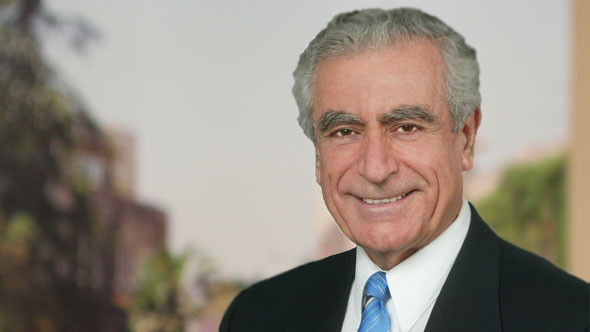
How is the attitude towards education in Lebanon different than in other Middle Eastern countries? Dubai is trying to promote education, Kuwait, Abu Dhabi is attracting universities from all around the world. So how is Lebanon really different in your opinion?
That is a very important question and let me answer it this way: as you might know, Lebanon has been known from time immemorial for its veneration for education, be it elementary, secondary, or higher education in Lebanon. This is very important, if you go back to the history of Lebanon you will realize that we have some institutions here that are very very old.
I´ll give you an example, our institution’s roots go back to 1835, when a woman out of Norwich, Connecticut by the name of Sarah Huntington Smith, came here and the first thing she wanted to do was to establish a school for the education of women in the Ottoman Empire. She did and the school began to evolve and now we´re a thriving institution of higher education. The point I´m trying to make is that Lebanon has always been known for the quality of education it offers. Parents sell even their properties to put their kids through school and this is something that´s very remarkable. Parents have been known to say to their kids “money comes and goes”, “property comes and goes”, but there´s one thing that no one can take away from you and that´s education. That´s why parents are prepared to make so many sacrifices in order to put their sons and daughters through school, elementary, secondary and University.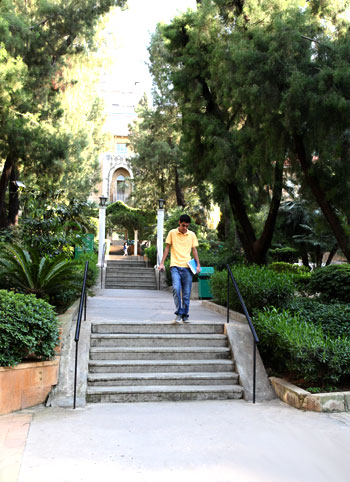
Now in the Arab world, and perhaps this strong commitment to education came later on, they have the same veneration for education. This is evident in Kuwait, in Saudi Arabia, in Bahrain, in the Emirates and other Arab countries as well. Further, now you have a lot of branches of American institutions that are coming to this area and setting themselves up to give young men and women a unique opportunity for education. But Lebanon has been from way back at the cutting edge of education.
And we have 2 major systems here in terms of Western Education; we have the French system represented by l’Université Saint Joseph and other institutions of high caliber, and the American system represented by the Lebanese American University (LAU) and the American University of Beirut (AUB).
What are the biggest challenges that the entire education system in Lebanon is facing? Is it the original situation, or is it these new emerging markets that are attracting more students, even the Chinese are doing a lot in terms of attracting students, so what are the biggest challenges for the Lebanese education system?
Excellent question! We have a number of challenges, first of all, the youth that we´re getting at the present time are no longer the youth that used to go to University way back. Young people who come to university now are very well-versed in so many areas and it is a major challenge for us to provide them with the best possible opportunity to earn an education that is second to none. It is important for us to provide them with the opportunity to come to university and to dream about their future and begin to realize their highest aspirations. This is one of the many things we do for our students at Lebanese American University.
So, they come here, they are fully prepared, and the Institution has to be ready for them. The second challenge is funding. Excellence for me is very expensive, and academic excellence is the most expensive of the entire variety; therefore, funding becomes a major challenge. We are a private not for profit institution, and like any other similar institution, there´s a limit to how much you can hike up tuition, because parents can only afford so much; so the challenge for institutions such as Lebanese American University is to fundraise and complement the tuition with money coming from a variety of sources. That is very important for us.
Lebanese American University and all other institutions of education are a home away from home, it´s a second home for our kids, for our young people, for our sons and daughters…
And in that regard, I always say excellence in academia goes through the bottom line. Some of the problems that institutions have run into in the United States, in Europe, everywhere in the world, is the fact that they did not pay attention to the bottom line, and I call that the slippery slope syndrome: we´ll do this and we´ll find out how we´re going to pay for it later, and in the final analysis the chickens will come to roost and all of a sudden if you don´t have a hefty endowment you find yourself in a hell of a mess, not being able to meet the challenges you´re facing in term of the payroll, labs, material that you really need for an effective educational process.
Now, another challenge in Lebanon is the confessional system itself. And a number of educational institutions are sponsored by religious denominations. The challenge then is to make sure that educational institutions are providing their students with the same civic education which is a sine qua non for citizenship and a strong commitment to and identification with Lebanon. Lebanese American University is a non-denominational institution and we get students from every single part of Lebanon and from every denomination. They come here to Lebanese American University and we make sure that their diversity is enriching rather than divisive. It is a challenge for us that we always need to make sure that we meet at any time. And it pays off. And it´s really marvelous to see these young men and women, coming to Lebanese American University to study together, to work together, to discuss their issues together, and reach some conclusions by peaceful means, and that´s a major role for our institution to play but still it´s a major challenge.
One of the challenges is of course the brain drain that Lebanon is experiencing because there are not opportunities for all these graduates, so which steps should be taken?
This is a very important comment but let me put that into perspective. Lebanon is a very small country and for a long time our graduates went everywhere in search of jobs. Before the Arab world opened up, they went to the West, they went to the United States, Europe, Mexico, they went to Latin America in general and when the Arab world opened up with the oil discovery and boom, our graduates settled in those countries and they are doing very well there.
Now those graduates who go to the Arab world, there is no major concern about them because they all keep a pied-à-terre here in Lebanon, they all have 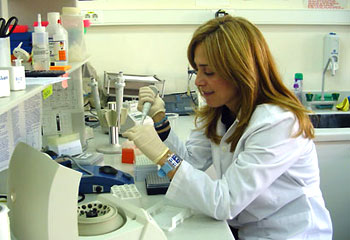 homes here, they come back here, they send their kids to schools here; however, that should not be an excuse for the Lebanese government not to create jobs for Lebanese graduates. Let’s face it, small countries have been known to establish all sorts of industries to employ young graduates. For example, the banking industry has been very important in Lebanon and banks here have been absorbing lots of our graduates. There should be no reason why the government can’t create a robust the Lebanese software industry for our youth; drug production industry is another area where the Lebanese government can invest for the sake of our youth. Again, there shouldn’t be any reason why the Lebanese government can’t do that. Similar small countries are doing just that. They are investing in these kinds of industry because they can employ a lot of people and these industries don´t cost as much as heavy industry does.
homes here, they come back here, they send their kids to schools here; however, that should not be an excuse for the Lebanese government not to create jobs for Lebanese graduates. Let’s face it, small countries have been known to establish all sorts of industries to employ young graduates. For example, the banking industry has been very important in Lebanon and banks here have been absorbing lots of our graduates. There should be no reason why the government can’t create a robust the Lebanese software industry for our youth; drug production industry is another area where the Lebanese government can invest for the sake of our youth. Again, there shouldn’t be any reason why the Lebanese government can’t do that. Similar small countries are doing just that. They are investing in these kinds of industry because they can employ a lot of people and these industries don´t cost as much as heavy industry does.
Next let´s move to Lebanese American University because we haven´t talked about it yet. What is your strategy for Lebanese American University, what sort of trend would you like to set up?
Well just let me give you a bit of background, about 8 years ago, in 2004, I joined Lebanese American University as President. We all at Lebanese American University agreed that our institution needed a strategic plan to give us a sense of direction. We were at a crossroads and we said there were a number of things we needed to do, and chief among them were the following:
– Accreditation: our programs needed to be accredited, our University needed to have regional accreditation. We also decided after a thorough feasibility study with Harvard medical International that LAU needed a medical school and a nursing school and we established both and within one year we will graduate our first medical class and this coming fall, we will admit our third nursing class. And to support the clinical needs of our schools of Medicine, Nursing, and Pharmacy, we bought Rizk Hospital in Ashrafiyeh, Beirut, and converted it into University Medical Center – Rizk Hospital (UMC-RH).
I would like you to know that our School of Pharmacy is still the only school of pharmacy that is accredited by the Accreditation Council on Pharmacy Education (ACPE) in the entire world outside the United States. Our School of Engineering is now accredited by ABET, Accreditation Board for Engineering and Technology, and so is our computer Science program.
So, all of the above needed a great deal of planning. As we grew in numbers and standing, we needed to expand physically, we needed to have sufficient and appropriate space for our students, for our faculty, for our staff. Just to give you an idea over the next 3 to 4 years we are committed to spending about 241 million US dollars on capital projects. we´re putting in new buildings on the Byblos campus, we have two campuses as you might know, Beirut and Byblos, 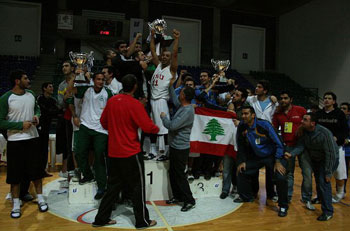 and we´re going to put in a major building for the School of Arts and Sciences here in Beirut which is going to cost us about 45 million dollars. All of the above needed a unified plan with respect to enrollment, finance, academia, and we needed to make sure that they all spoke to each other. So the first 5-year strategic plan responded to the institution´s aspirations and needs and we completed it with a USD 67.1M fundraising campaign, one year ahead of time.
and we´re going to put in a major building for the School of Arts and Sciences here in Beirut which is going to cost us about 45 million dollars. All of the above needed a unified plan with respect to enrollment, finance, academia, and we needed to make sure that they all spoke to each other. So the first 5-year strategic plan responded to the institution´s aspirations and needs and we completed it with a USD 67.1M fundraising campaign, one year ahead of time.
Now, we have a new 5-year strategic plan which is academically focused and it has 6 pillars which are really important and are going to guide our efforts to be excellent in all that we do. The first one of course is education, the second is teaching, the third is students, the fourth is civic education, the fifth is areas of concern, and the sixth is graduate education.
When you talked about technical projects worth 250 million US dollars, you mentioned that funding is a major challenge for you, how are you going to accomplish this?
We will accomplish it because we are in the trenches day in and day out, convincing benefactors and donors that education, higher education, is a great cause and a great investment in the future of Lebanon and the entire MENA region. Because we have a strong faith in what we do, money has been coming into the University’s coffers to support our students and our capital endeavors. People have been responding so positively to our cause and I am happy to tell you that in the past 8 years I have never asked somebody to contribute to an endowed scholarship and they´ve said no to me. I am confident that we will raise the money that we need for the continued progress of Lebanese American University.
But the same thing could be said about other higher education institutions in Lebanon. How is Lebanese American University different from them?
We have an incredible spirit, we have a mission that is absolutely unique and let me talk about that for a moment. We are an institution that is committed to excellence in everything we do, not only academic excellence but excellence in everything we do, and that is very important. Secondly, we are an institution which focuses on the education of the whole person, not only academic education, but as well the maturity, the personal growth of our people, because we firmly believe that when our graduates leave this institution they need to land on their feet, not only academically, not only professionally, but also as leaders of tomorrow, who are full of confidence to face the challenges waiting for them out there, so the education of the whole person is important, and that is why we offer a great deal of counseling at this institution and we consider our students to be our sons and daughters. Although we don’t give them anything for nothing, but should they happen to fall, we extend a hand to them, raise them up, and tell them to go at it again.
There is another thing that we firmly believe in and that is unique, we are men and women for others. In other words, we firmly believe in the notion of noble service, we are here to serve, we serve our students, we serve our faculty, we serve our staff but more importantly we serve society.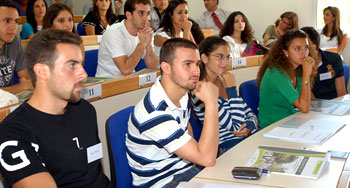
So these 3 elements are crucial, are unique in fact to our mission as an institution of higher education. We have a burning passion to carry out, not only to carry out, but to live our mission; we live our mission day in and day out, we know what our mission is all about, our faculty go out of their way to help our students, to serve society, our staff go out of their way to support the institution´s mission, to serve our students better, so that the latter in their own right become better leaders in Lebanon and beyond. The global village needs young people’s idealism and enthusiasm. We make sure that their idealism, that their enthusiasm, continue to burn passionately in them, continues to give them energy so that they can go on to build their own careers and give back to society, not only in terms of money but give back of themselves so that other people can have better lives, very important and very, very unique, don´t you think?
It is indeed, but some of the things you mentioned should be done in the family, how people are raised, specific responsibilities. It´s very difficult once people are grown-ups, starting from 21 years old etc, to really change their perceptions. What you mentioned should happen in the family, don´t you think?
There´s no doubt that it should happen in the family, now if it doesn’t happen in the family then we are here to provide it, if it does happen in the family then we are here to strengthen it. As you well know in our modern world there are a lot of things that don´t happen anymore in the family, we have a world that is characterized by consumerism, we have a world where husband and wife have to work very hard in order to make ends meet; the challenges, the pressures on families are just immense and some of the good things that used to take place in the family don´t anymore, and universities, schools in general, have really to play the role of in loco parentis, the role of the family, and that´s why they say that educational institutions are homes away from home.
They are a second home for our kids, for our young people, for our sons and daughters. So you´re absolutely right good habits, good things should take place in the family, but given the world we live in sometimes they don´t, and if they don´t we have the obligation not only the responsibility but the obligation to provide them for our students, and where they do take place to a certain extent we´re here to strengthen them, as I said.
In the interview you mentioned your past 8 years, what you decided to do, now looking forward I want to ask something from you, from the inside, what is your personal vision, your personal fight.
I believe firmly in the role of a university in shaping the minds and hearts of young people; it´s very important for me, and I think in everything we do in our academic programs, in our capital plans, in our financial plans, that vision is not lost on anybody, they know it´s a vision that I cherish very, very much, they know it´s a vision that I live, and we are here to serve youth, to provide the best possible educational opportunity for our youth, for our young people.
Young people are really longing for a place they can identify with, the sense of belonging in this world is at times very difficult to have or acquire and we´re here to provide that sense of belonging in a world that is buffeted by all sorts of pressure. I consider myself to have been a lucky young person, because I was sheltered in my upbringing, I didn’t have what young people have now. I mean students come here and they think they know everything, they have everything, but they are running into many challenges relating to family, peer groups, friends, etc. So we are here to provide that sense of direction, to orient them, to say “you are the future, you are our hope, and you can change our world for the better”.
The sense of caring for others is very important, and a lot of times, on a lot of occasions, that sense of caring of telling somebody “I care for you”, has been lost because of the incredible gamut of pressures that we have to react to, to endure. So it´s that sense of humanity, that seems quite often to be missing, that we´re trying here to cultivate, and to care for; we need more young people who care for the world and not only for their careers.
It´s very important to care for one´s own career, but at the same time, it´s very important to care for others. That´s why to those students who receive scholarships here we say “look somebody has thought of helping you”, when you graduate and you establish your career we expect that you help someone else, that you care for someone else.
When you say that you expect that you´ll care for someone else later, is that where your fundraising comes from, from the older students who are now very well established?
Yes, those are alumni who are very important to us and we are cultivating them all the time. We are close to 35 alumni chapters the world over, in North America, Canada, the United States, the Arab world, Europe, you name it. But at the same time, we have a lot of benefactors who are not Lebanese American University graduates, but they have heard our message and they are giving because they believe in it, they believe in making a difference in the life of a young man or woman, so our funding doesn´t only come from our alumni, it comes from people who are willing to help, people who are blessed and have the money to say I want to really give of my own money to help others.
And this is our culture at Lebanese American University. This is unique to us and we are constantly trying to cultivate that; here´s Lebanese American University, an institution of higher education where our people in development, our faculty in the classroom, our staff, practice, rather live, the notion of caring for others. We instill a sense of humanity in our people, a sense of balance between academic excellence and personal maturity, for we don’t want to graduate students who are misfits in society. We need that personal maturity, personal growth, which is very important to complement academic excellence. Am I making any sense?
Of course. Lebanese American University is not just a cold institution of education that is there, but you are also caring for people, trying to develop the whole personality, making a real complete human being who´s not just after money, after career…
I think that´s the sense I spoke about, the caring and sense of humanity which are very important to us. I don´t want you to say that´s what they´re emphasizing only and they´re forgetting about education which is really the raison d’être of our institution.
We have a motto that I´m fond of, and that is Excellence is our Passion, LAU is our Pride. Thank you.